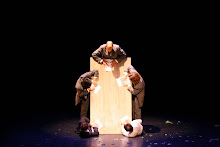Friday, May 13, 2005
Dada Poetry
According to Hugo Ball, inventor of dadaist phonetic poetry, we must withdraw into the deepest alchemy of words, reserving to poetry its most sacred ground": a program whichwould have -appealed to Velemir Chlebnikov, "eternal prisoner of assonance", for whom the alphabet was a "table of sounds". Chlebnikov wanted to immerse himself in the depths of the Russian etymons, of the etymological night, in search of a mythical panslavonic language "whose shoots must grow through the thicknesses of modem Russian". The ultra modem tends to link up with the archaic, eternal contradiction of avant-gardes. Stravinsky's "Rite of Spring' (composed in the years 1912-13) is a musical flight from time, a return to the common archaic background, to magic, spells, a primitive religious paganism.Illogical phonic sound, abstract poetry, was taken up by dadaism from Italian and Russian futurism. In Zurich, at the Cabaret Voltaire, founded in 1916 by five friends, Hugo Ball Tristan Tzara, Hans Arp, Marcel Janco and Richard Huelsenbeck, first simultaneous poems by Henri-Martin Barzun and Jarry's "Ubu Roi" were recited. Later Tzara declaimed some of his simultaneous such as "La Fièvre Poems, puerpérale" a "Froid Lumiére", for the purpose of representing the dualism between the soul (the voice) and the world (mechanistic process, fate) represented by noises. "Les chants nègres" was a collective performance with masks, soutanes, drums, dances: a sort of funeral service.Here, one evening, Hugo Ball read his "Verses without words", based on the equilibrium of vowels, regulated and distributed exclusively in relation to the phonic value of the initial line. Clothed in azure, scarlet and golden cardboard, with a cylindrical shaman's hat on his head - it is Ball's own description - "I began with:*The accents became heavier, _expression increased with the intensification of the consonants. I soon noted that my means of _expression, when I wanted to be serious (and I wanted to be at all costs) no longer corresponded to the pomp of the staging... to the right on the lectern I had "Labadas Gesang die Wolken" (Labada's song to the clouds) and on the left "Elefantenkarawane" (The caravan of the Elephants)... the dragging rhythm of the elements had permitted me a last crescendo, but how to continue to the end? I then noticed that my voice, which apparently had no other choice, was assumed an ancient cadence of sacerdotal lament in the style of the masses sung in the Catholic churches of the east and west. I do not know what this music inspired in me, but I began to sing my sequences of vowels in recitative liturgical manner. The electric light was turned off as arranged and I was carried away covered in perspiration like a a magical bishop who disappears into the abyss" (Dei Flucht aus der Zeit" "The flight from time", Munich, 1927). Thus was dada phonetic poetry born.
Subscribe to:
Post Comments (Atom)





No comments:
Post a Comment